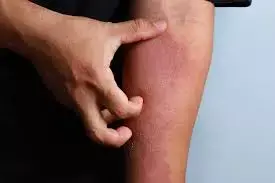- Home
- Medical news & Guidelines
- Anesthesiology
- Cardiology and CTVS
- Critical Care
- Dentistry
- Dermatology
- Diabetes and Endocrinology
- ENT
- Gastroenterology
- Medicine
- Nephrology
- Neurology
- Obstretics-Gynaecology
- Oncology
- Ophthalmology
- Orthopaedics
- Pediatrics-Neonatology
- Psychiatry
- Pulmonology
- Radiology
- Surgery
- Urology
- Laboratory Medicine
- Diet
- Nursing
- Paramedical
- Physiotherapy
- Health news
- Fact Check
- Bone Health Fact Check
- Brain Health Fact Check
- Cancer Related Fact Check
- Child Care Fact Check
- Dental and oral health fact check
- Diabetes and metabolic health fact check
- Diet and Nutrition Fact Check
- Eye and ENT Care Fact Check
- Fitness fact check
- Gut health fact check
- Heart health fact check
- Kidney health fact check
- Medical education fact check
- Men's health fact check
- Respiratory fact check
- Skin and hair care fact check
- Vaccine and Immunization fact check
- Women's health fact check
- AYUSH
- State News
- Andaman and Nicobar Islands
- Andhra Pradesh
- Arunachal Pradesh
- Assam
- Bihar
- Chandigarh
- Chattisgarh
- Dadra and Nagar Haveli
- Daman and Diu
- Delhi
- Goa
- Gujarat
- Haryana
- Himachal Pradesh
- Jammu & Kashmir
- Jharkhand
- Karnataka
- Kerala
- Ladakh
- Lakshadweep
- Madhya Pradesh
- Maharashtra
- Manipur
- Meghalaya
- Mizoram
- Nagaland
- Odisha
- Puducherry
- Punjab
- Rajasthan
- Sikkim
- Tamil Nadu
- Telangana
- Tripura
- Uttar Pradesh
- Uttrakhand
- West Bengal
- Medical Education
- Industry
Calcium intake below certain threshold associated with higher risk of eczema: Study

Calcium intake below a certain threshold is associated with a higher risk of eczema suggests a study published in the Scientific Reports.
Eczema is a common chronic skin condition. Previous studies indicated that dietary factors, such as calcium intake, might influence the onset and progression of eczema in the population of gravidas and infants. However, there were no studies on the correlation between dietary calcium and the adult population. In this study, we aim to investigate the correlation between dietary calcium intake and the prevalence of eczema in adults.
The characteristics of adults (≥ 18 years) were collected from the National Health and Nutrition Examination Survey (NHANES) 2005–2006 database. Dietary calcium intake was assessed using the 24-hour dietary recall method. The prevalence of eczema was determined through an allergy questionnaire. Logistic regression modelling was applied to analyze the correlation between dietary calcium intake and eczema prevalence. Restricted cubic spline (RCS) was used to investigate the nonlinear relationship between calcium intake and eczema. A two-stage linear regression model was used to calculate calcium intake's critical effect on eczema's prevalence by smoothed curve fitting. Subgroup analyses were performed to explore the effect of different demographic characteristics on the relationship between dietary calcium intake and eczema.
Results In this cross-sectional study, we collected 4086 adult samples. There were 1930 males (46.9%) and 2156 females (53.1%), at the average age of 46.7 years, and 266 participants (7.6%) were diagnosed with eczema. Logistic regression results showed there was a significant difference between the third quartile group and eczema compared to the 1st quartile group of dietary calcium (OR: 1.913, 95% CI: 1.024–3.576, P = 0.043). The RCS showed an inverted U-shaped correlation between dietary calcium intake and eczema prevalence (non-linear P-value < 0.05). An increase in calcium intake was associated with an increase in eczema prevalence when the logarithmic value of dietary calcium intake was below 7.089 (OR: 1.790, 95% CI: 1.006–3.183, P = 0.048).
These data indicated there was an inverted U-shaped correlation between dietary calcium intake and the prevalence of eczema, which suggested moderate reduction of calcium intake might be beneficial in the incidence of eczema. Further prospective studies are needed to explore causal relationships and optimal calcium intake levels to prevent eczema.
Reference:
Wu, Q., Guo, Z., Zhang, N. et al. Correlation between dietary calcium intake and eczema in American adult population. Sci Rep 14, 31270 (2024). https://doi.org/10.1038/s41598-024-82723-x
Dr. Shravani Dali has completed her BDS from Pravara institute of medical sciences, loni. Following which she extensively worked in the healthcare sector for 2+ years. She has been actively involved in writing blogs in field of health and wellness. Currently she is pursuing her Masters of public health-health administration from Tata institute of social sciences. She can be contacted at editorial@medicaldialogues.in.
Dr Kamal Kant Kohli-MBBS, DTCD- a chest specialist with more than 30 years of practice and a flair for writing clinical articles, Dr Kamal Kant Kohli joined Medical Dialogues as a Chief Editor of Medical News. Besides writing articles, as an editor, he proofreads and verifies all the medical content published on Medical Dialogues including those coming from journals, studies,medical conferences,guidelines etc. Email: drkohli@medicaldialogues.in. Contact no. 011-43720751


